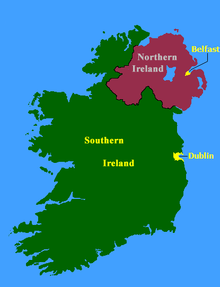
Back Акт аб урадзе Ірландыі (1920) Byelorussian Acta del Govern d'Irlanda de 1920 Catalan Government of Ireland Act 1920 Danish Government of Ireland Act (1920) German Ley de Gobierno de Irlanda de 1920 Spanish 1920ko Irlandako Gobernuaren Akta Basque Government of Ireland Act (1920) Finnish Loi sur le gouvernement de l'Irlande de 1920 French An tAcht um Rialtas na hÉireann (1920) Irish Government of Ireland Act Italian
This article includes a list of general references, but it lacks sufficient corresponding inline citations. (January 2014) |
 | |
| Long title | An Act to provide for the better Government of Ireland. |
|---|---|
| Citation | 10 & 11 Geo. 5. c. 67 |
| Introduced by | David Lloyd George (Commons) |
| Territorial extent | United Kingdom of Great Britain and Ireland |
| Dates | |
| Royal assent | 23 December 1920 |
| Commencement | 3 May 1921[1][2] |
| Repealed |
|
| Other legislation | |
| Repeals/revokes | Government of Ireland Act 1914 |
| Repealed by |
|
Status: Repealed | |
| Text of statute as originally enacted | |

The Government of Ireland Act 1920 was an Act of the Parliament of the United Kingdom. The Act's long title was "An Act to provide for the better government of Ireland"; it is also known as the Fourth Home Rule Bill or (inaccurately) as the Fourth Home Rule Act and informally known as the Partition Act.[3] The Act was intended to partition Ireland into two self-governing polities: the six north-eastern counties were to form "Northern Ireland", while the larger part of the country was to form "Southern Ireland". Both territories were to remain part of the United Kingdom of Great Britain and Ireland and provision was made for their future reunification through a Council of Ireland. The Act was passed by the British Parliament in November 1920, received royal assent in December and came into force on 3 May 1921.[4][5]
The smaller Northern Ireland was duly created with a devolved government and remained in the UK. The larger Southern Ireland was not recognized by most of its citizens, who instead recognized the self-declared Irish Republic in the ongoing Irish War of Independence. The conflict resulted in the Anglo-Irish Treaty in December 1921. Under the treaty, Ireland would leave the UK (with the option for Northern Ireland to opt out and remain in the UK, which it immediately did) in December 1922 and become the Irish Free State, which would later evolve into today's Republic of Ireland. The institutions set up under this Act for Northern Ireland continued to function until they were suspended by the British parliament in 1972 as a consequence of the Troubles.
The remaining provisions of the Act still in force in Northern Ireland were repealed under the terms of the 1998 Good Friday Agreement.
- ^ SR&O 1921/533
- ^ Quekett 1933 p.116
- ^ Gallagher, Frank (1957). The Indivisible Island. London: Victor Gollancz Ltd. p. 138.
- ^ O'Day 1998, p. 299.
- ^ Jackson 2004, p. 368–370.
© MMXXIII Rich X Search. We shall prevail. All rights reserved. Rich X Search
